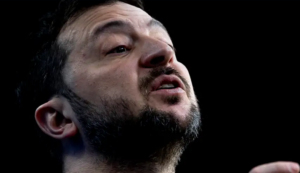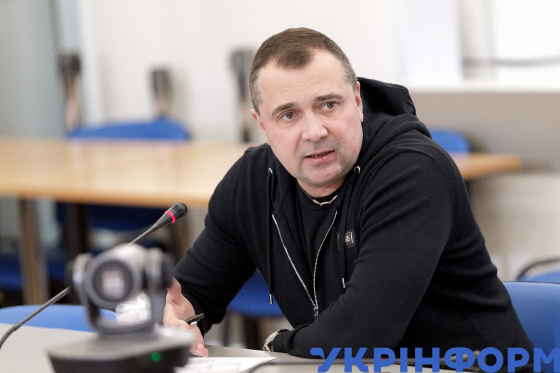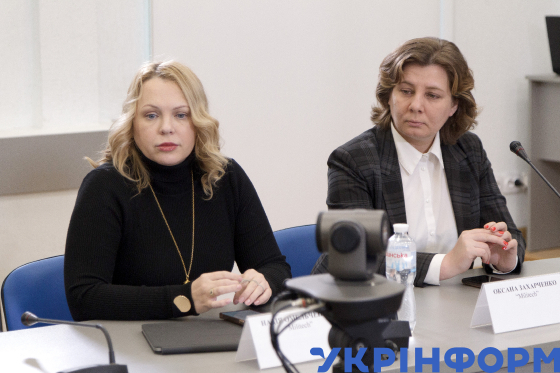
The US wants to trade further military and financial aid to Ukraine for access to the country’s vast rare earth reserves. But some might already be under Russian control, and the EU is moving in for its share, too.
US President Donald Trump has placed new conditions on further financial and military aid to Ukraine.
On Monday, he told reporters that Washington would only continue aiding Ukraine in warding off Russian aggression in exchange for rare earth minerals.
Kyiv had already indicated it would be willing to trade access to these valuable natural resources for Western support. In fact, it was one of the points Ukrainian President Volodymyr Zelenskyy had outlined in the “victory plan” that he presented late last year when it was still unclear who would occupy the White House in 2025.
At the time, Zelenskyy had been in talks with Trump, and had promised any country willing to support Kyiv that there would be “returns on investments” made in his country. While presenting his plan, he also mentioned Ukraine’s rich natural resources, which amounted to “trillions of US dollars’ worth of vitally important metals.”
Indispensable in modern industries
Rare earth minerals are needed to produce many modern devices, such as smartphones, electric vehicles, and other high-tech products. They are indispensable in weapons manufacturing and the aerospace industry.
China currently controls the lion’s share of industrially used rare earth minerals worldwide. According to a recent report
by the World Economic Forum, this covers about 40% of the European Union’s (EU) needs for these resources. Other key providers include Australia, South Africa, Canada and Brazil.
To reduce their dependency on China, the US and EU have been working together for years on expanding and increasing the production of vital resources in other countries. These metals, include, above all, uranium, titanium, lithium, graphite, nickel, and aluminum.
Last year, a study
by the NATO Energy Security Center of Excellence found that the market for critical minerals “has doubled to over $320 billion [€308.7 billion] in the last five years and is foreseen to double again in the next five.”
Enormous wealth of critical minerals
The NATO experts also noted that “the strategic importance of Ukraine’s critical materials cannot be overstated,” arguing that the country could become a key supplier of rare earth minerals, including titanium, lithium, beryllium, manganese, gallium, uranium, zirconium, graphite, apatite, fluorite and nickel. These vast reserves could “significantly contribute to the global supply chain for many, if not all,” prominent industries.
Ukraine’s titanium reserves are thought to be Europe’s largest, making some 7% of global reserves. It’s one of the few countries mining titanium, which is a key resource for the aerospace, medical, automotive and marine industries, for example.
Estimated at around 500,000 tons, Ukraine also holds some of Europe’s largest known lithium reserves. This material is critical for producing batteries, ceramics, and glass.
Ukraine is also the world’s fifth-largest producer of gallium, which is used for producing semiconductors and light-emitting diodes (LEDs). Finally, Ukraine is a critical supplier of neon gas, required for producing semiconductors.
The World Economic Forum report further found that the European Commission had identified Ukraine as a potential supplier for over 20 critical raw materials. The body recommended that Europe continue to encourage Ukraine to export these materials, and concluded that Ukraine’s accession to the EU could strengthen the European economy.
Ukraine an important part of the EU resource strategy
Kyiv seems to be well aware of its key position as a potential global supplier of critical minerals needed for key industries. At a conference on strategic resources, the former Ukrainian infrastructure minister an co-founder of the investment think tank We Build Ukraine, Oleksandr Kubrakov, noted that, “we own crucial resources, we are strategically well-positioned within the EU context, our logistical infrastructure is well-developed and we are highly competent in discovering and exploiting resources.”
But critics say that optimal conditions for mining critical minerals would require governmental oversight, a stable regulatory framework, an economically tolerable tax policy, and investments. It’s uncertain if the US, should it gain access to some of Ukraine’s critical natural resources, would even be able to initiate such structural change.
Meanwhile, authorities in Kyiv are already reporting on first steps and concrete plans: “We are currently making data on these minerals public and have worked out many regulatory and legal measures,” Olena Kramarenko, Ukraine’s deputy minister of environmental protection said.
She added that the strategic goal was to “integrate Ukraine into the EU’s resource strategy.”
Some reserves occupied by Russia
The largest hurdle to exploiting rare earth minerals in Ukraine remains Russia’s war of aggression. There are no reliable numbers available of just how many rare mineral reserves are under Russian control, or dangerously near front lines.
Ukrainian experts told DW they believe that Russia could be trying to gain control over at least two lithium reserves. Of the four known across Ukraine, only two are sure to be under Ukrainian control.
The territories of Zaporizhzhia and Donetsk, where the other two reserves are located, are currently under Russian occupation.
https://www.dw.com/en/ukraines-rare-earths-are-key-to-its-bargaining-power/a-71531476

On the margins of the World Economic Forum in Davos, Switzerland, Ukrainian President Volodymyr Zelenskyy has held a meeting with Prime Minister of the Socialist Republic of Vietnam Pham Minh Chinh.
The head of state thanked Vietnam for supporting the territorial integrity and sovereignty of Ukraine, as well as for humanitarian aid to our country, the press service of the President of Ukraine reported.
“The interlocutors noted the importance of intensifying bilateral relations, as Ukraine and Vietnam are united by long-standing ties. The President called on Vietnam to support the implementation of the points of the Ukrainian peace formula,” – noted in the message.
Volodymyr Zelensky and Pham Minh Chinh discussed the possibility of activating bilateral contacts between Ukraine and Vietnam at different levels.
DAVOS, Pham Minh Chinh, VIETNAM, Volodymyr Zelenskyy, WORLD ECONOMIC FORUM
Large-scale and high-quality training of UAV operators requires changes to the Ministry of Defense regulations and implementation of relevant state standards
In addition to increasing the production of various unmanned aerial vehicles (UAVs) for the Armed Forces of Ukraine (AFU), it is imperative to increase the number of trained UAV operators who will have the appropriate state certificates and will be able to effectively destroy Russian occupiers and conduct aerial reconnaissance. To achieve this, the Ministry of Defense of Ukraine needs to amend some of its regulations and, with the participation of UAV manufacturers, training centers and the Ministry of Education and Science of Ukraine, develop and approve appropriate state training programs and certification of trained UAV operators. In addition, local governments and military administrations can and should play an important role in solving this problem.
This was discussed at the roundtable “Actual Problems of UAV Operators Training” held on December 19 at the state news agency Ukrinform at the initiative of the online analytical publication KyivVlada.
https://www.youtube.com/watch?v=x_BiHJsiGAg&t=1s
Recently, President of Ukraine Volodymyr Zelenskyy announced at a press conference that one million FPV drones will be produced in Ukraine next year. Prior to that, the President emphasized that protecting Ukraine from the Russian Federation is everyone’s business, especially those in the rear, including local governments.
At the same time, since the main customer of UAVs is the Ministry of Defense at the request of the General Staff of the Armed Forces of Ukraine, the first question that was discussed was why the Ministry of Defense does not pay private centers for training UAV operators? According to Anton Podlutskyi, the host of the roundtable and co-founder of KyivVlada, other government agencies, such as the State Border Guard Service of Ukraine, the Ministry of Digital Transformation of Ukraine, and the National Police, pay for the training of UAV operators for their own needs.
Maksym Polyvianyi, Executive Director of the National Association of Defense Industry Enterprises of Ukraine (NAUDI), noted that the main problem with the Ministry of Defense not contracting and paying for UAV operator training is the lack of an appropriate regulatory framework. “The Ministry of Defense, and now the Defense Procurement Agency, which will start purchasing weapons and military equipment, including UAVs, next year, has no regulatory basis for separately signing contracts for training services,” said the NAUDI executive director.

In his professional opinion, it is necessary to create a regulatory framework for certification of training centers for UAV operators of any purpose – from aerial reconnaissance to FPV drones, from tactical UAVs to strategic UAVs. “Each contract for the purchase of UAVs from a manufacturer should include several training sessions for representatives of the Armed Forces. The manufacturer should develop a training program – time, theory, practice, all of this is specified in the contract and carried out directly by the manufacturer,” emphasized Maksym Polyvianyi.
He also said that NAUDI and the National Aviation University (NAU) have launched a joint program under which the Association awards scholarships to students who will work as technical and engineering specialists at UAV manufacturing companies.
Nadiia Omelchenko, CEO of Militech, a drone manufacturing company, who is involved in the development of state standards for UAV operator education, emphasized that a systematic and high-quality solution to the problem requires collaboration between manufacturers, the Ministry of Defense, the Ministry of Education, and volunteer movements.

“The military says there are not enough training centers for UAV operators. However, not every training center, even from manufacturers, can issue the appropriate certificate. However, we, as manufacturers, are very interested in having well-trained specialists flying our UAVs. Our training center first teaches the theoretical part, then simulator training, and out of a group of 10-20 students, not all of them make it to the third part of the training – field tests. But we can only organize field tests in cooperation with the Armed Forces. So even here we need collaboration,” said the Militech CEO.
Denys Cherednychenko, a member of the board of founders of DEVIRO (manufacturer of Leleka and Leleka-100 UAVs), said that his company has gone through the entire difficult process of certifying its UAVs and training its operators, having received a certificate from the State Aviation Service of Ukraine. “Our cadets receive state-issued certificates that have all the necessary details, so our cadets receive an appropriate military specialty and a salary supplement… We now have more than 30 instructors who have official status and can teach the relevant program. We also accept civilians for training,” said a member of the DEVIRO founding board, noting that training one crew (three operators) of the Leleka-100 costs approximately 300 thousand hryvnias.
Nevertheless, Denys Cherednychenko noted, his company provides training for UAV operators free of charge, as the Ministry of Defense has no procedures that would allow the defense department to pay for this work. “Experts in the Ministry of Defense are aware of this issue, but they are severely limited by the existing regulatory framework, which does not allow private centers to receive state funding for training UAV operators,” said the DEVIRO representative.
Denys Cherednychenko drew attention to another problem: state training centers, including those of the Ministry of Defense, train UAV operators according to a shortened program and do not grant the status of an external UAV operator: “That is, cadets are students of courses that receive certificates that the Ministry of Defense itself does not recognize and does not provide after training in the relevant military accounting specialty.”
The DEVIRO founding board member believes that UAV manufacturers and private operator training centers should work closely with the Ministry of Defense to help defense experts make the necessary changes to the regulations governing the MoD.
“For each type of UAV, a corresponding state-approved educational program should be created, so we can talk about a full-fledged certification of operator training,” emphasized Denys Cherednychenko.
Vadym Ivchenko, MP and representative of the Verkhovna Rada Committee on National Security, Defense and Intelligence, emphasized that public-private partnership should be the most appropriate format for addressing the issue of UAV operator training. It should be noted that the relevant law was adopted in Ukraine in the summer of 2010.
At the same time, the MP agrees that the Ministry of Defense should now amend its own bylaws to have the right and opportunity to pay private entities for training UAV operators for the needs of the Armed Forces of Ukraine.
Vadym Ivchenko also believes that it is the UAV manufacturers who should offer the state a vision for the development of this segment of the military equipment market – a strategy for 10-15 years. At the same time, the MP believes that private UAV manufacturers should establish training centers.
Denys Cherednychenko agreed with this, but also reminded that the creation and operation of training centers requires considerable funds that could be used to improve drones. “For private companies to be interested and not afraid to invest in the creation of their training centers, the Ministry of Defense should create an appropriate regulatory framework,” said a member of the founding board of DEVIRO, urging fellow UAV manufacturers to obtain certificates from the State Aviation Service, as this facilitates a working dialogue with the Ministry of Defense.
Maksym Polyvianyi, Executive Director of NAUDI, reminded that many UAVs are being created in Ukraine, which are lethal weapons. “A private company will not be able to train operators of such drones without ammunition, a program to provide specially equipped training grounds… These issues cannot be resolved without the participation of the Ministry of Defense,” emphasized Maksym Polyvanyi.
He called on all private UAV manufacturers and private operator training schools to join the work on developing changes to the existing regulatory framework of the Ministry of Defense.
Anton Podlutskyi, the roundtable’s host, emphasized that all educational institutions in Ukraine are under the supervision of the Ministry of Education and Science, and there is not a single educational institution that is fully under the supervision of the Ministry of Defense. Therefore, the role of the Ministry of Education in the process of training UAV operators – from secondary schools to universities – is crucial.
In response, Maksym Polyvianyi noted that military universities still have programs approved by the Ministry of Defense. And, in his opinion, changes in educational programs are important, but these changes will not solve the current challenges now, but only after some time.
However, according to Militech CEO Nadiia Omelchenko, changes to educational programs are relevant. “We (the company’s representatives) participate in the team that prepares state professional standards for UAV operators. It involves not only private companies but also educational institutions. This is not happening very fast, but I think these standards will be announced in some time,” said Nadiia Omelchenko.
The issue of cooperation between private UAV manufacturers and training centers with local governments and military administrations was also discussed.
Anton Podlutsky, the host of the roundtable, emphasized that Kyiv, with its multibillion-dollar budget, is fully capable of launching a powerful drone production and training centers that will provide the Armed Forces with thousands of professionally trained UAV operators. As a reminder, the Kyiv City Military Administration (KCMA) is currently the main governing structure in the capital of Ukraine, and the head of the KCMA is the deputy head of the KCMA for civilian affairs.
Denys Cherednychenko said that his company has a positive experience in working with local governments and military administrations. “Everyone is happy to help – they provide places for training, help us communicate with law enforcement agencies, etc.”, said the member of the DEVIRO founding board.
Maksym Polyvianyi noted that some difficult issues can be resolved on the ground without additional budgetary funds if fruitful communication and cooperation with the military administration or local government is established.
According to Nadiia Omelchenko, local authorities are open to cooperation, but need very specific requests and proposals. Her colleague from Militech, Oksana Zakharchenko, emphasized that it is necessary to continue to increase the attention of the media, society and government to the training of UAV operators.
Armed Forces of Ukraine, KyivVlada, Maksym Polyvianyi, Ministry of Defense of Ukraine, Nadiia Omelchenko, Volodymyr Zelenskyy, Денис Чередниченко